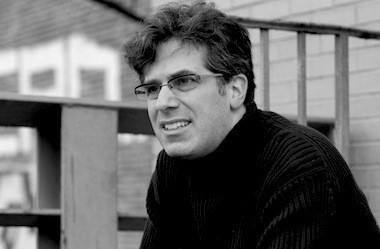Wordstock 2010: Jonathan Lethem

With slightly mussed hair, glasses, and a dark blazer over a blue Powell’s shirt, Jonathan Lethem almost looked more Portlander than Brooklynite on Saturday afternoon at the center stage. Certainly, Lethem seemed comfortable speaking to the sizeable crowd that filled up the seats in front of the Powell’s Books stage.
As well he should: the author of 8 novels (more than one bestseller and the latest voted the “Best Book of the Year” by the New York Times Book Review), he already has a large cadre of fans and undoubtedly made a few more in the course of his reading.
Intense and nearly frantic in his hilarity, Lethem read from 2009’s Chronic City, which takes place in a somewhat Kafkaesque version of New York City, or as he put it, in a city gone “strange around the edges”—replete with a bloodthirsty tiger running loose on the streets. The novel parallels his own conflicted relationship with the city: he is an exile, an outsider in his own hometown, forever drawn inward in the hopes to discovering its center.
He reads: The narrator, an aging child star coasting through life on his former fame, and his eccentric friends share a joint, desperately trying to figure out how to get rid of a nest of eagles that have made their home on an apartment ledge. (The scene ends with all three chanting “Blame the tiger! Blame the tiger!”) Then, fast-forwarding, the narrator is alone in his apartment, reflecting on his life and on the city, watching the birds on a distant, nameless church spire.
Lethem’s words are like fractals, forever resolving into yet more inexplicable shapes and colors, and I fail to do justice to their ability to enthrall. At one point during the reading, when music from another stage threatened to drown him out, Lethem seemed not to notice and neither did the crowd, both descending further into his mad and beautiful city.
Here are 5 things you missed:
1. Lethem is obsessed with what he calls the “inexpressibility of life”—those moments, things or places that cannot be boiled down to enough words, hard though he may try.
2. Lethem used to think that for fiction to be fiction, everything in it had to be fictitious (i.e. real places and people couldn’t exist in novels). He has long-since abandoned this idea.
3. Lethem saw Stars Wars 22 times in the summer of 1977.
4. Lethem writes very slowly.
5. Art is about intention, after all. Despite the complexity of his metaphors and the depth of his descriptive layering, Lethem is honest about what he means in his writing. He is an explainer, he says, who doesn’t hide behind “I don’t know what I meant there.”
